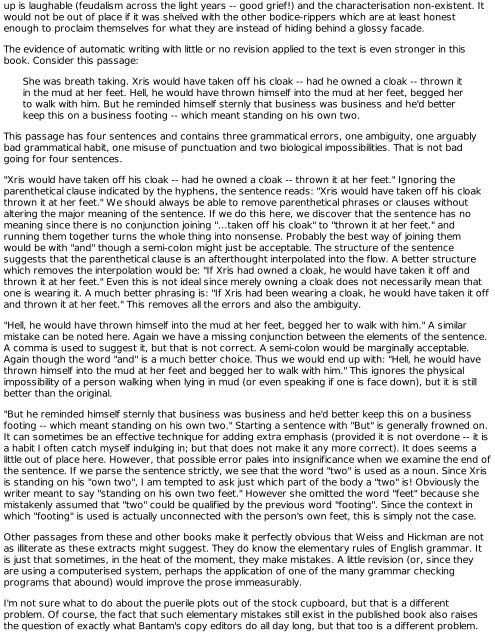Triffids Beard 2 - The Bearded Triffid
Triffids Beard 2 - The Bearded Triffid
Triffids Beard 2 - The Bearded Triffid
Create successful ePaper yourself
Turn your PDF publications into a flip-book with our unique Google optimized e-Paper software.
up is laughable (feudalism across the light years -- good grief!) and the characterisation non-existent. It<br />
would not be out of place if it was shelved with the other bodice-rippers which are at least honest<br />
enough to proclaim themselves for what they are instead of hiding behind a glossy facade.<br />
<strong>The</strong> evidence of automatic writing with little or no revision applied to the text is even stronger in this<br />
book. Consider this passage:<br />
She was breath taking. Xris would have taken off his cloak -- had he owned a cloak -- thrown it<br />
in the mud at her feet. Hell, he would have thrown himself into the mud at her feet, begged her<br />
to walk with him. But he reminded himself sternly that business was business and he'd better<br />
keep this on a business footing -- which meant standing on his own two.<br />
This passage has four sentences and contains three grammatical errors, one ambiguity, one arguably<br />
bad grammatical habit, one misuse of punctuation and two biological impossibilities. That is not bad<br />
going for four sentences.<br />
"Xris would have taken off his cloak -- had he owned a cloak -- thrown it at her feet." Ignoring the<br />
parenthetical clause indicated by the hyphens, the sentence reads: "Xris would have taken off his cloak<br />
thrown it at her feet." We should always be able to remove parenthetical phrases or clauses without<br />
altering the major meaning of the sentence. If we do this here, we discover that the sentence has no<br />
meaning since there is no conjunction joining "…taken off his cloak" to "thrown it at her feet." and<br />
running them together turns the whole thing into nonsense. Probably the best way of joining them<br />
would be with "and" though a semi-colon might just be acceptable. <strong>The</strong> structure of the sentence<br />
suggests that the parenthetical clause is an afterthought interpolated into the flow. A better structure<br />
which removes the interpolation would be: "If Xris had owned a cloak, he would have taken it off and<br />
thrown it at her feet." Even this is not ideal since merely owning a cloak does not necessarily mean that<br />
one is wearing it. A much better phrasing is: "If Xris had been wearing a cloak, he would have taken it off<br />
and thrown it at her feet." This removes all the errors and also the ambiguity.<br />
"Hell, he would have thrown himself into the mud at her feet, begged her to walk with him." A similar<br />
mistake can be noted here. Again we have a missing conjunction between the elements of the sentence.<br />
A comma is used to suggest it, but that is not correct. A semi-colon would be marginally acceptable.<br />
Again though the word "and" is a much better choice. Thus we would end up with: "Hell, he would have<br />
thrown himself into the mud at her feet and begged her to walk with him." This ignores the physical<br />
impossibility of a person walking when lying in mud (or even speaking if one is face down), but it is still<br />
better than the original.<br />
"But he reminded himself sternly that business was business and he'd better keep this on a business<br />
footing -- which meant standing on his own two." Starting a sentence with "But" is generally frowned on.<br />
It can sometimes be an effective technique for adding extra emphasis (provided it is not overdone -- it is<br />
a habit I often catch myself indulging in; but that does not make it any more correct). It does seems a<br />
little out of place here. However, that possible error pales into insignificance when we examine the end of<br />
the sentence. If we parse the sentence strictly, we see that the word "two" is used as a noun. Since Xris<br />
is standing on his "own two", I am tempted to ask just which part of the body a "two" is! Obviously the<br />
writer meant to say "standing on his own two feet." However she omitted the word "feet" because she<br />
mistakenly assumed that "two" could be qualified by the previous word "footing". Since the context in<br />
which "footing" is used is actually unconnected with the person's own feet, this is simply not the case.<br />
Other passages from these and other books make it perfectly obvious that Weiss and Hickman are not<br />
as illiterate as these extracts might suggest. <strong>The</strong>y do know the elementary rules of English grammar. It<br />
is just that sometimes, in the heat of the moment, they make mistakes. A little revision (or, since they<br />
are using a computerised system, perhaps the application of one of the many grammar checking<br />
programs that abound) would improve the prose immeasurably.<br />
I'm not sure what to do about the puerile plots out of the stock cupboard, but that is a different<br />
problem. Of course, the fact that such elementary mistakes still exist in the published book also raises<br />
the question of exactly what Bantam's copy editors do all day long, but that too is a different problem.


